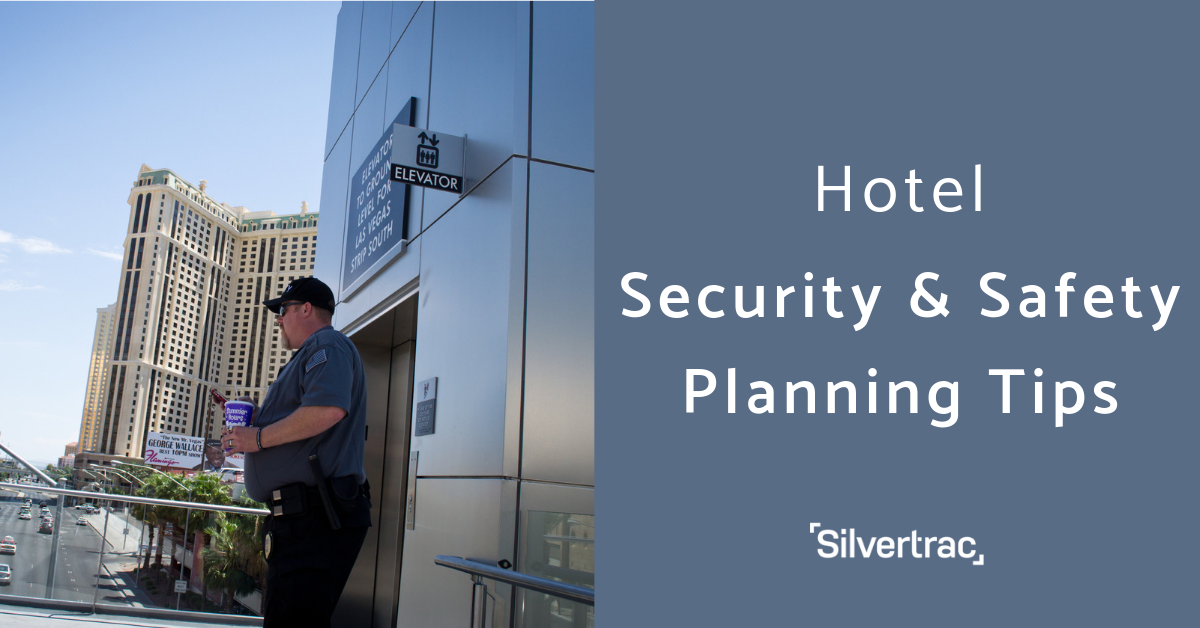The Silvertrac Extra
Implementing Hotel Security & Safety Programs

A decade after the 2008 recession, the hospitality and hotel industry shows no signs of slowing it's rapid growth. Hotel bookings have risen approximately $69 billion over the last ten years, not including additional growth in airfare, travel, cruise attendance, and restaurants visits.
With this type of stellar industry growth, there comes a need for advanced hotel safety and security programs to maintain a level of normalcy. Travelers want no only themselves, but also their property to be safe whenever they venture away from home. From the biggest resorts to smaller chain establishments, its becoming an industry standard to require security systems and technology to report and react swiftly to property incidents.
Many of us are familiar with the 2017 Las Vegas tragedy, but violent encounters aren’t the only incidents that hotels need to protect themselves and their guests against. There are plenty of day-to-day "normal" crimes hotels need to account for, like petty theft, property damage & data breaches.
A combination of physical security software, video surveillance, and organization-wide security training are great starting off points for building a strong hotel security program.
Security Officers
An on-site security team is far more likely to mitigate risk and report incidents as they happen rather than a security for hire service who only acts on-call.
Just like a multi-family or commercial property, hotels have different checkpoints they need to ensure are secured. These checkpoints may include service entrances, pools, gyms, spas, hotel stores, and back-of-house offices. Security officers should conduct checkpoint round tours regularly throughout the day to ensure each checkpoint is secure.
With so many people coming in and out of the hotel property any given day, roaming security officers are a highly important addition to typical guard tours. These officers are given specific sections of the hotel to observe & report any suspicious activity or individuals. Hotels should place roaming security officers in all of their high-capacity areas, ie: check-in lobby areas, pools, casinos, restaurants, and parking lots.
Plus, the appearance of a well-suited security team alone will assist in increase guests’ comfort level and reduction of potential threats.
Video Surveillance
Video surveillance systems are extremely important & effective in hotels & resorts because of one reason in particular: real-time or even live footage capturing. It is unrealistic that any security officer can be staffed at every potential incident-location at all times. Video surveillance accounts for this.
Additionally, video footage can be monitored remotely. Even some of the lower budget systems have the capability of seeing anything a manager would need from anywhere, at anytime, as long as they are connected to the internet. This type of real-time footage can help if an incident occurs and important security personnel aren’t on-site. They can remote in and start directing their security teams right away or pass off the footage to law enforcement in the case of an emergency.
Thankfully, the equipment needed to run video surveillance can be easily managed and maintained. The cameras can be easily placed wherever they are needed and can be adjusted at any time.
Organization-Wide Training
As previously mentioned, security officers can’t be at every potential incident-location at all times. While video surveillance will help to monitor the property, if something happens, it may take time for a security officer to arrive on scene.
Organization-wide training on basic security skills can help keep the staff safe and allow the security team to do their job more effectively. If an incident occurs but the only employee around to witness it is a non-security employee, that employee should be trained to debrief the security team so they can jump into action quickly.
Basic security training should include, but isn’t limited to: situational awareness, first aid/tourniquets, and verbal de-escaltion.
If a bodily injury occurs, employees should be able to provide basic first aid attention and be able to stop any bleeding, should someone sustain a bodily injury. Without immediate attention, it could be too late when security or medical professionals arrive.
And all customer facing employees should have some sort of basic verbal confrontation training, so as to not escalate a situation with an unruly guest or trespasser.
While these 3 hotel security planning tactics are a great starting point, a fully integrated security plan will take more insight into the needs of the property and the owner. So if you need more planning resources, check out additional suggestions here!





